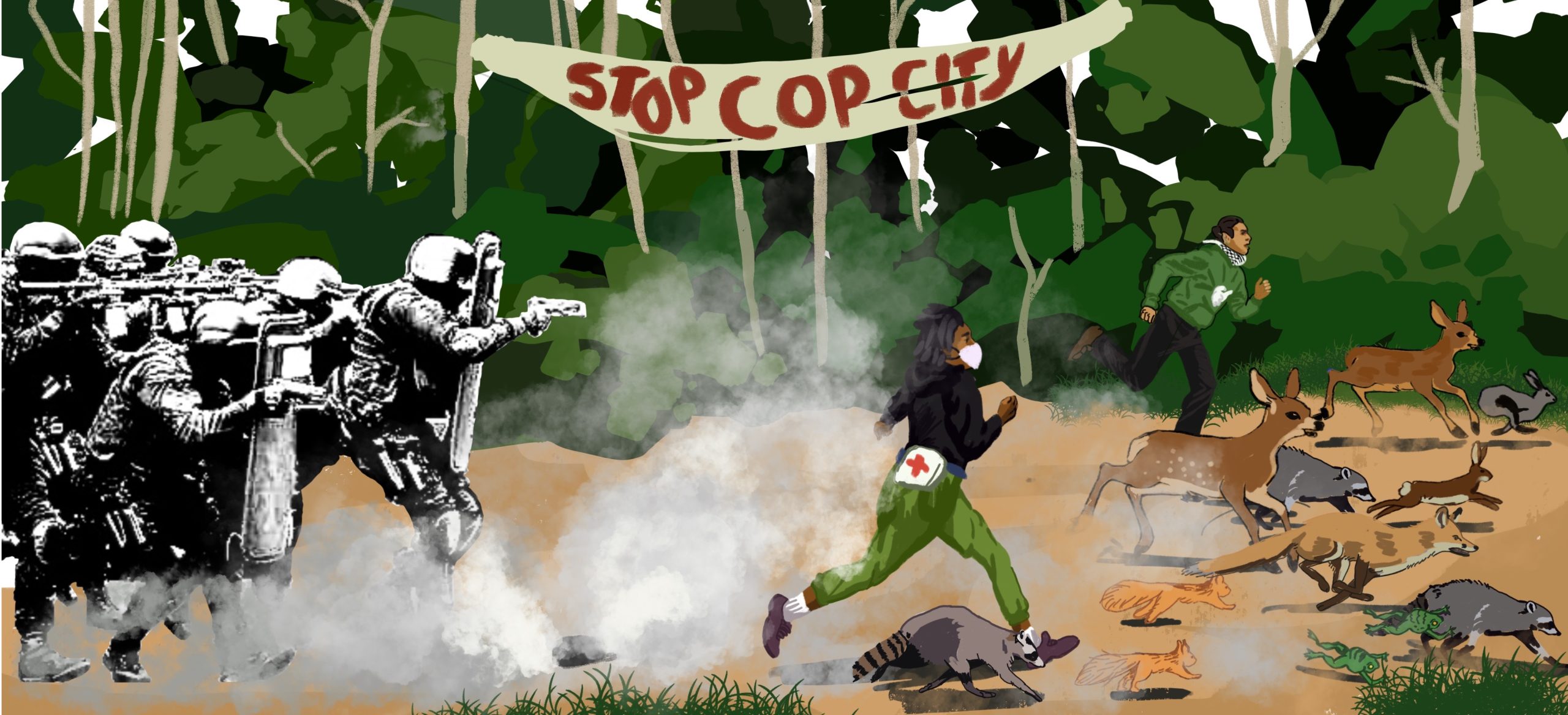From Atlanta to Oregon, cop cities are being built which constitute a significant danger to our community. These facilities add to the already disproportionate targeting of Black and Brown neighborhoods, amplifying already existing racial inequalities. Creating cop cities in predominantly Black and Brown areas perpetuates heightened surveillance and policing, thus continuing the cycle of mass incarceration in the most marginalized communities. Cop cities continue a pattern of colonization and occupation of Indigenous land, creating more harm to the land and the people with hyper-militarized force.
The first to be given the name “Cop City” was the Atlanta Public Safety Training Center. This is the city of Atlanta’s latest project to expand over-policing in Westside, a predominantly Black neighborhood classified as a gentrification pressure area.
With more than 70% of residents against the building of the training center, it’s no surprise community input has been minimal, both before and during the making of Atlanta’s Cop City. It’s evident the interests of private companies are being prioritized rather than the community struggling against unjust inequalities. Cop cities are something everyone should be aware of and watch closely, as they set a precedent for this country and its further mobilization toward fascism.
The mock city will be occupied with detonation-testing sites, shooting ranges and training simulations. Taxpayers bear the brunt of funding the project—contributing approximately $30 million—while the remainder comes from private philanthropy and corporate donors, including Chick-fil-A, Coca-Cola and Delta Airlines.
Currently under construction, the whopping $90-million 300-acre project casts its shadow upon the Old Atlanta Prison farm, a since-abandoned prison. The prison resides in the Weelaunee Forest, a 3,500-acre forest and original homeland of the Indigenous Muscogee Creek Nation.
Following the Indian Removal Act of 1830, the Muscogee Creek people were forcibly evicted from their homes. After the removal of Indigenous peoples, the land was seized and transformed into slave plantations by white settlers.
The proposal of Atlanta’s Cop City brings about a multitude of dangers for the community and the environment. Building and operating such an expansive facility significantly affects our ecosystem, removing green space and polluting the land and water.
While the city of Atlanta claims the facility will only take up 85 acres, they’ve continued to clear more trees for the expansion of Atlanta’s Cop City, which could potentially result in habitat loss and impacted ecosystems.
Additionally, the ramifications of noise pollution arising from Atlanta’s Cop City will significantly impact wildlife, disrupting their innate behaviors and potentially inflicting long-term damage on populations.
Residents near the area often report the sound of gunfire, questioning the necessity of the supposedly-necessary training center. Merely the sound generated by cop cities poses as a trigger for people and animals alike.
In communities already grappling with social inequities, cop cities only validate mistrust towards the police, with heightened surveillance and personnel who are armed with military-grade weapons.
Furthermore, the paramilitary atmosphere could further militarize already violent policing tactics, specifically targeting Black people. It’s crucial to highlight that Atlanta’s Cop City is directly connected to Operation Shield, a law enforcement operation comprising nearly 11,000 surveillance cameras.
Both these projects serve as a harsh reminder that the city of Atlanta—like many cities nationwide—has a solid commitment to increasing police presence in attempts to intimidate and criminalize the Black population, posing a threat to the safety, well-being and humanity of Black people.
For the last three decades, the Atlanta Police Department has conducted training and information exchanges with Israeli Police Forces (IPF) and organizations. The IPF enforces and participates in the illegal occupation of Palestine, often using extreme force and abusive tactics.
The methods of occupation shared by Israeli and Atlanta’s Cop City law enforcement are drastically similar. The attempts to occupy the South River region closely mirrors the unjust and authoritarian occupation of Palestinian land.
The objective is clear: to impose militarized conditions on Black citizens in the area, criminalize their activities and create a population who can be easily funneled into the prison industrial complex and forced to work slave labor.
Since the announcement of Atlanta’s Cop City, environmentalists and activists have staunchly opposed the project, highlighting concerns about the facility’s detrimental impact on the South River region. Defend the Atlanta Forest (DTF)—a collective of activists—intends to thwart the development of Atlanta’s Cop City in the Weelaunee forest.
They are affiliated with Stop Cop City, a broader movement with the same objective of liberating the most vulnerable land and people. To protest Atlanta’s Cop City, protestors have undertaken a multitude of peaceful initiatives—such as tree-sitting and drafting letters of eviction to the city—as well as engaging in direct action, which often results in violent altercations with the police.
As of Feb. 2024, over 60 people have been indicted with domestic terrorist charges. In Jan. 2024, a deadly clash ended in the murder of 26-year-old Tortuguita. Indigenous queer activists opposing Atlanta’s Cop City were shot by police at least 14 times, and—according to the autopsy—were most likely in a cross-legged sitting position when murdered. The murder of Tortuguita was nothing short of state-sanctioned violence for any form of dissent.
Unfortunately, the expansion of these cop cities does not end in the South River region, as the city plans to establish more cop cities across counties. There are plans to sprout more cop cities nationwide in Colorado Springs, Colo.; San Pablo, Calif.; Honolulu; Pittsburgh and Columbus, amongst many others.
Oregon joins the list of states intending to establish a militarized training center in Redmond, Ore. The facility costs $49 million, with the Redmond City Council committing $9 million and taxpayers funding the remaining $40 million. On Jan. 29, the Redmond police invited the community to view the newest design and construction plans for the facility.
Redmond Police argue their current police station is too small and its systems are failing. In hopes of creating a new facility, they intend to enhance the ability to assist those with mental health crises, provide secure parking and better evidence storage.
These measures are ineffective, and rather than advocating for community care, they advocate for the most extreme forms of policing. Just imagine the progress we’d make had those funds been invested into uplifting the community.
While there haven’t been explicit proposals of a cop city in Portland, Portlanders should remain cautious of the possibility. In Portland, our Black and Brown communities are already targeted at disproportionately high rates. Should we see a cop city built here, we’d witness drastic budget cuts to essential community resources. Ultimately, constructing a cop city anywhere in Portland is a detrimental threat to the safety of our communities.
Putting a halt to the construction of a cop city in Redmond, or really anywhere in Oregon, is vital if we want to protect our communities and stop ourselves from falling into a militarized police state.
Alongside the dangers to the environment and people, such costly investments neglect vital investments in resources serving the community, including mental health services, affordable housing and access to food. Instead, we should redirect these funds to more community-driven projects if we want to be committed to cultivating a community operated by trust and safety.
Fortunately, there are a multitude of actions we can take to resist the construction of a militarized police city, from direct action—such as tree-sitting demonstrated by DTF—to informational zines created by Stop Cop City comrades. Putting an end to Atlanta’s Cop City will require all our efforts.






